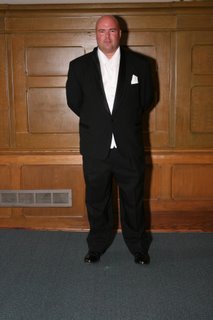
Crazy John's review of "V for Vendetta"
V FOR VENDETTA (2006)
director: James McTeigue
Once in awhile, a film comes along that stumps its viewer. V for Vendetta did that to me. There is much to applaud in this film and yet often one is rolling his eyes in disbelief. At the end of the day, we have an ambitious film which I praise despite some poor decisions made along the way.
Based on a ten issue comic book series from the mid-80s by British writer Alan Moore and artist David Lloyd, the comic is first and foremost political. Written during the conservative Margaret Thatcher administration, the comic speculates on a future England where rights have been trampled and power abused. Into this world comes V.(played by Hugo Weaving in the movie), a superhero via Abbie Hoffman, wearing a Guy Fawkes mask and a gift for blowing up symbols of London. He is aided by Evey (Natalie Portman in the film), a young woman whose parents were political radicals murdered by the State. Is V. a terrorist or a revolutionary and is there a difference? Do the ends justify the means? For V.’s creators the answer to this last question is yes. With more dialogue than action, V for Vendetta was not a comic I expected to be adapted into a giant Hollywood motion picture. Yet, via producer Joel Silver (Die Hard) and the writers the Wachowski Brothers (duh, The Matrix), the world now has a movie that is equal parts Batman and George Orwell.
I am surprised that the politics are still present even if it is in a far more simplistic (i.e.- easy) form. There are no shades of grey in the film. The villains are fanatics, rapists, child murderers, and fascists in black boots and uniforms straight out of a post WWII pulp novel. John Hurt who played Winston Smith in the 1980s version of 1984, is here cast as Big Brother and he screams every line of dialogue.
First time director James McTeigue oversells many moments. To show how bad the food is in prison, McTeigue has a rat refusing to eat from the plate! V.’s underground lair is complete with a piano, a TV, a jukebox with 300 songs, impressive artwork, and hundreds of books. Considering this is suppose to be a secret hideout in the abandon subways of London, one wonders how he was able to sneak in a piano or a jukebox. Not since the sixties pop classic Danger: Diabolik has a most wanted criminal had such a spread! The climax of the film involves thousands of Guy Fawkes masks being delivered all over London. This produces some amazing visuals, but it also raises questions of practicality (where were they made? How did V. get them to the post office?).
All of this sounds like complaints, and in most any other film, they would be, but V for Vendetta has unique charms. It boasts a strong visual style with striking set design. It has Hugo Weaving never once showing his face and ideally cast as V. It has Natalie Portman making up for sleepwalking through the Star Wars films. It has Stephen Rea as the detective trying to catch V. while wrestling with his own conscious. It has exciting sequences and even thought. It even has the cleverest Kiss Me Deadly reference since Pulp Fiction. However, the film does walk a line as its Matrix inspired trailer suggests. The film changes the comic to make it more like an action film. There is a climatic showdown with the worst of the villains and in slow motion no less. Despite the ending, action fans may be disappointed by the long middle section where hero and villain fight with words instead of bullets and throwing knives. Science fiction fans may be intrigued by the future presented, a world where the public have traded their freedom for security (any similarity to actual events is NOT purely coincidental!). These two sides of V for Vendetta do not always mix, but I was intrigued. For that reason, I recommend it faults and all.

No comments:
Post a Comment